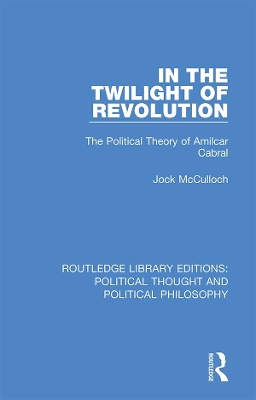Routledge Library Editions: Political Thought and Political Philosophy
1 primary work
Book 39
First published in 1983. Amilcar Cabral was one of Africa's leading revolutionary figures. Universally recognised as the founding father at the independent state of Guine-Bissau, he was also the first truly important political thinker to have emerged from Africa's two decades of revolution. This book was the first publication to present a critical analysis of his standing as a political theorist.
Born in 1925 in the then Portuguese colony of Guine, Cabral devoted his life to the liberation of his people from colonialism and was instrumental in founding the PAIGC, the African Party for the Independence of Guine and Cape Verde. He was assassinated early in 1973, but the PAIGC continued his task and Guine-Bissau gained independence in September 1973. Guine's revolution came late, but it was a genuine revolution and, like all revolutions, was accompanied by a theory of its own. That theory is found in the writings of Cabral. In this study Jack McCulloch explains that, because of the conjunction of a number of historical factors, the revolution in Guine assumed an importance for out of proportion to the size or economic significance of the country, and shows that consequently Cabral's theory has come to have an historical significance of its own.
This account of Cabral's political theory demonstrates clearly that the effect of Cabral's career was to help bring down the last of the great colonial empires in Africa and, in the realm of theory, to dismantle the central shibboleths of African socialism.
